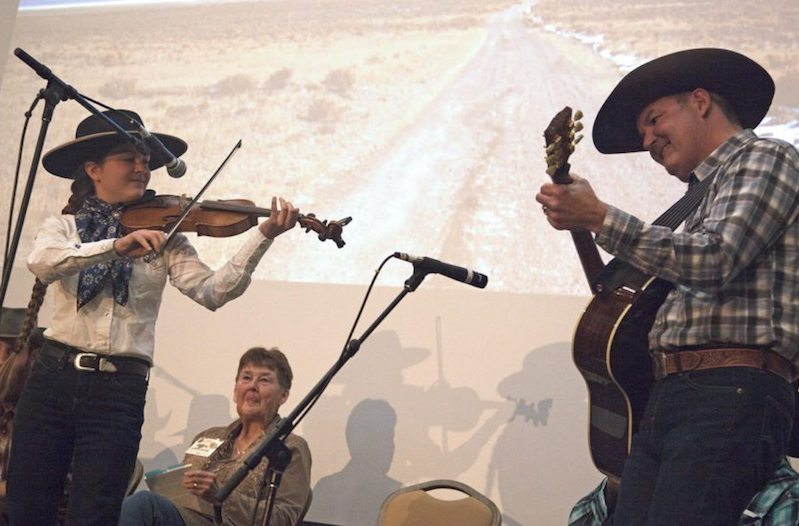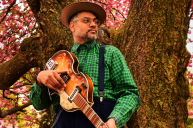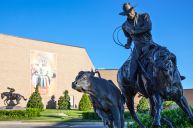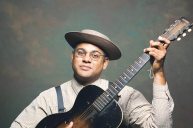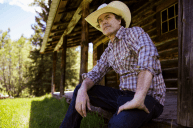[dropcap]A[/dropcap]t the National Cowboy Poetry Gathering in Elko, Nev., storytelling is king. It's stories of family, stories of history and heritage, stories of ranches, rodeos and rolling cigarettes, mountain ranges and meadows - stories of the west - that bind together generations who've spent their lives working land and cattle. The stories are the reason thousands of bronco-busters and city dwelling desperados have descended on Nevada's cowboy country for the 33rd installment of this week long festival celebrating the music, poetry and craftsmanship that defines the modern rural west.
Poems on the Range
Cowboys and poetry may not seem to go hand in hand. But a week at the National Cowboy Poetry Gathering will change your mind. Maybe you have a particular vision of a cowboy; the stoic high plains drifter who rides into town with a pistol by his side. Or a man who hawks Marlboro cigarettes.
Elko's cowboys and cowgirls are decidedly non-Hollywood. There's no "all hat, no cattle" posturing here. The men and women of cowboy poetry are the real deal and they have the words to prove it.
Granted, the stoicism of the old western wrangler is still here. The bards, dressed in pressed pearl snap shirts and Wranglers, saddle up to the podium for their recitation with a quiet grace. Then, with a sly grin, they'll deliver a stanza that leaves the audience in stitches.
But it's not all laughter. It's common to see weathered ranchers wiping away tears when listening to a classic poem written by a revered cowboy poet of days past, such as Badger Clark or Buck Ramsey.
Nebraska rancher, humorist and poet R.P. Smith caught the cowboy poetry bug years ago while watching late night television.
"I was home one night and my wife told me that there were a couple of poets that were going to be on the Johnny Carson show," Smith says. "I stayed up past by bedtime and watched those guys and it kind of planted a seed."
After inspiration struck, Smith wrote a poem for a friend's wedding present. It was a hit. In 2000, he attended his first poetry gathering in Elko. Since then, he's been making his way up to the festival every chance he gets.
"Poetry has made me a better rancher and ranching has sure enough made me a better poet," Smith says.
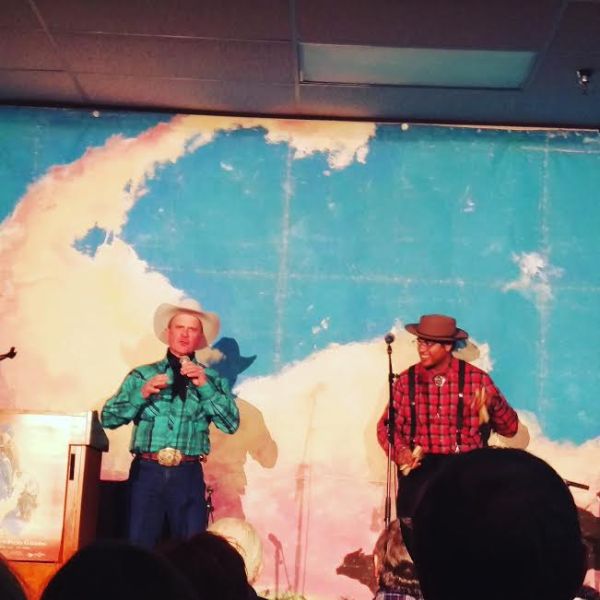
Photo: Bobbie Jean Sawyer
Infused with wit and wisdom, Smith is able to share his experience as a rancher with those who've never lived the lifestyle.
"Everything I do is not one hundred years ago," Smith says. "Hopefully for the people in the audience it puts a face to the people who are trying to make a living at this deal on the agriculture side."
Saddle Songs
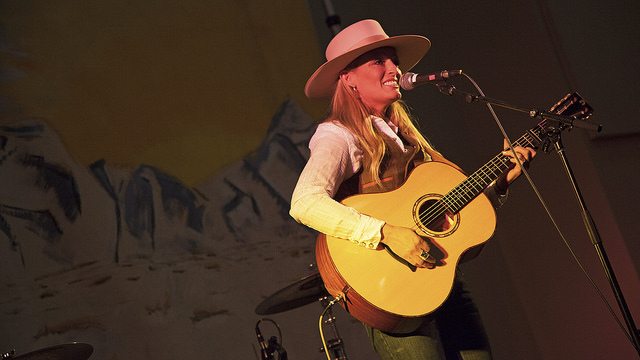
Singer Trinity Seely onstage at the 2017 National Cowboy Poetry Gathering. Source: Sydney Martinez/ Travel Nevada
If cowboy poetry has a more mainstream cousin in the American cultural lexicon, it's the cowboy ballad. These songs, sung by immigrants as they moved westward in the 1800s, have been passed down for generations. The lyrics are synonymous with the Old West.
But what is a cowboy, really? And what makes a song a cowboy song?
Canadian singer-songwriter Corb Lund is a frequent performer at the Elko gathering. He says authentic cowboy songs are rooted in the truth of rural western living.
"The word cowboy has become very loosely applied - like the guy on the Harley, the iron cowboys or whatever. To me, it actually literally means someone who works with cattle," Lund says. "I know that's a little narrow. But generally speaking it has to have something to do with rural lifestyle and agriculture and animal husbandry to really be a cowboy."
Lund, who grew up on a family-owned cattle ranch in Alberta, writes about the rural west from a modern perspective.
"I think I have one foot in traditional western song and the other foot is in some other galaxy," Lund says. "All I do is write songs about what it's like to be me, which is somebody who has that background and many generations of it in the family but is living in the 21st century."
Lund's song "S Lazy H," from his 2015 release Things That Can't Be Undone, explores what happens when the family ranch land gets chopped up and sold off.
You can watch Lund's performance at the 2017 National Cowboy Poetry Gathering here.
Goodbye Old Paint
Grammy-winning folk musician and two-time Elko performer Dom Flemons grew up watching cowboy poets and singers perform at festivals and poetry gatherings in his native Arizona.
"It wasn't until I moved up to the East Coast that I realized that cowboy music wasn't something you saw everywhere," Flemons says.
Flemons, a founding member of the North Carolina string band The Carolina Chocolate Drops, calls cowboy music a "melting pot" of musical genres. Blues, jazz, ragtime and Mexican vaquero music have heavily influenced what we now know as cowboy music.
Flemons is currently working on an album of songs that will focus on the black cowboys' influence on the American west.
"(Black cowboys) were not only present in the west but they were an essential part of the story, " Flemons says. "The representation of black cowboys has just been right on the fringes so I thought that just having an album that was "Black Cowboy 101" — it would kind of just explain how this history has been hidden."
Among those cowboys Flemons sings about is Charlie Willis, a black cowboy known for his skills on the range and his singing voice. On long trail rides, he calmed some 15,000 head of cattle just with his songs.
Willis influenced western culture forever when he authored the cowboy ballad standard, "Goodbye Old Paint." He taught the song to a young boy named Jess Morris, who became an accomplished singer and fiddle player. Musicologist and folklorist John A. Lomax recorded Morris singing "Goodbye Old Paint," preserving the tune for future generations. Morris' recording is now in the American Folklife Center at the Library of Congress.
Below, watch Dom Flemons perform "He's A Lone Ranger" at last year's National Cowboy Poetry Gathering.
Evening in Elko
It's Saturday evening at the National Cowboy Poetry Gathering. Armies of cowboy hats, western scarves and handlebar mustaches file in the Elko Convention Center for the late night dance. This year, the Texas swing band Doug Moreland and the Flying Armadillos leads the festivities. As the band launches into the Bob Wills' classic "Right Or Wrong," festival performers and fans spin around the dance floor with wild abandon. It's here and now that the heart of Elko really shines. Young and old, urban and rural, are all still dancing to the same old song.
The National Cowboy Poetry Gathering is held every February in Elko, Nev. Fo-r more information, visit here.
